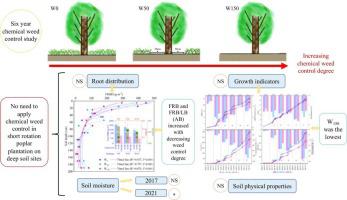Industrial Crops and Products ( IF 5.9 ) Pub Date : 2022-05-09 , DOI: 10.1016/j.indcrop.2022.115025 Jingyi Fu 1 , Songyan Zou 1 , Mark Coleman 2 , Ximeng Li 3 , Wei Hu 4 , Aoyu Wang 1 , Pei Zhang 1 , Zihang Zeng 5 , Changjun Ding 6 , Benye Xi 1 , Nan Di 7

|
Chemical weed control has been widely applied in plantation forests around the world. However, understanding the long-term influence of weed control on stand growth and its underlying mechanisms is still limited. We conducted a six-year (2016–2021; an entire rotation) weed control study in Chinese white poplar (Populus tomentosa Carr.) plantations established using tall planting stock on a deep soil site, which is a typical afforestation mode for poplars in north China. Three treatments of chemical weed control degree were implemented: no weeding (W0), removing weeds within 50 cm distance from the tree row (W50) and removing all weeds on the ground (W150). Different tree growth indicators, soil water content (θ), tree root distribution, and soil physical properties were measured. There was no weed control degree effect on θ in 2017 (P = 0.4408) but significant θ difference (P = 0.0140) among treatments existed in 0–30 cm soil in 2021. Different degrees of weed control did not change soil physical properties (P > 0.05) after the long-term application of chemical weeding. There were no differences (P > 0.05) in all growth indicators. But the cumulative increments of tree diameter, height, stand volume index, and biomass at the end of the rotation in W150 were numerically 2–27% lower than W0 and 11–26% lower than W50. The total fine roots biomass increased with decreasing weed control degree, although the difference was non-significant (P > 0.05). The fine root distribution pattern indicated that there might be many fine roots below 200 cm depth. The tree growth response to weed control may be attributed to tall planting stock that avoids light competition from weeds and deep soil resource exploration by tree roots that alleviate competition by shallow weed roots. Consequently, it may be unnecessary to apply chemical weed control in poplar plantations established using tall planting stock on deep soil sites. Our findings provide guidance for the sustainable management of industrial plantation forests.



























 京公网安备 11010802027423号
京公网安备 11010802027423号